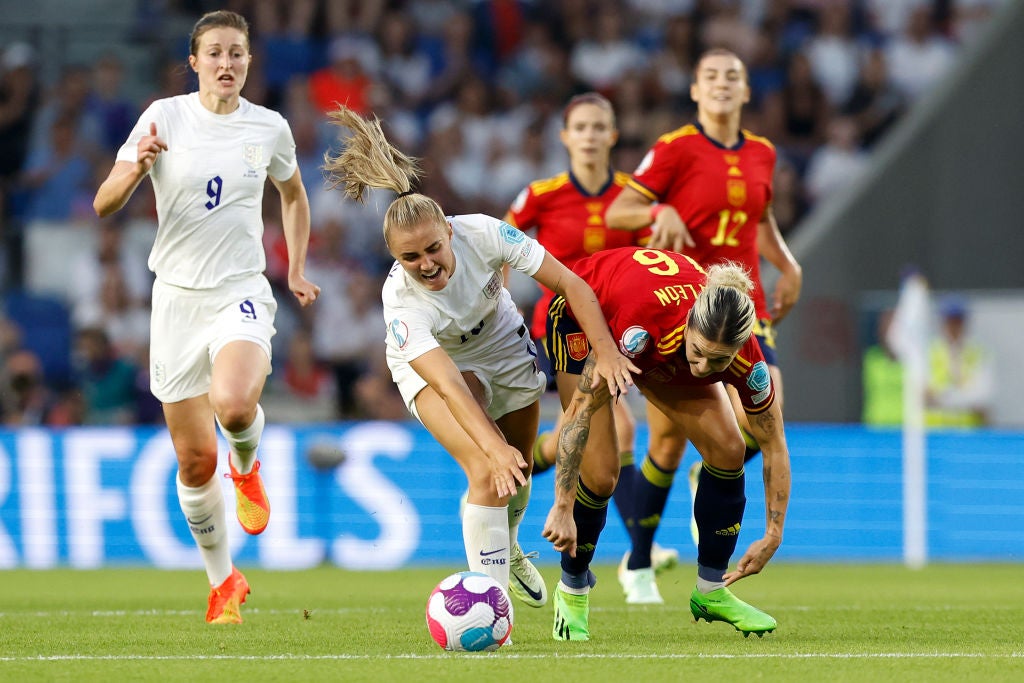
It was the type of goal that Georgia Stanway, growing up in the footballing outpost of Barrow-in-Furness, playing in the back garden with her brothers, would always have imagined herself scoring. The sort of emphatic, long-range strike that is befitting of such a stage, that deserved to book England’s place in the semi-finals of another major international tournament.
But in the white heat of the extra time win over Spain in Brighton, when that dream had become a reality, it was a moment she could barely remember.
“It all feels like a massive blur at the moment,” the Bayern Munich-bound midfielder said after the final whistle. “I need to watch it back and see where I was, how it went in the net, I literally can’t remember. I remember saying to one of the girls, ‘At what moment did we actually score?’”
That is one of the great ironies of such moments in elite sport. While a goal as spectacular and as significant as Stanway’s will live long in the memory of many who witnessed it, whether they were one of the 28,994 inside the Amex or the millions watching at home, it will only be a vague, hazed mess of sweat, strains and lactic acid in the mind of the woman who scored it. You wait all your life to score a goal like that and then struggle to remember how you did what did, or even why you did.
“A lot of the girls before the game said to me I need to shoot more,” she revealed. “Coming into this tournament, I’d not had masses of efforts on goal. I don’t know why I shot. I don’t know what came over me. Usually I would probably pass that ball to the winger and expect the ball to be put back in the box. But I just thought, what is the worst that can happen?”
Watch it back, as Stanway will doubtlessly have done by the time you read this. There is perhaps a split second’s indecision as she bursts through the midfield, as though she can’t quite believe the opportunity presenting itself to her. “I think it was because nobody came to me,” she said.
“I’d expect a defender to step out to me and put me under some pressure or challenge my decision making. Nobody came to me. When the defender makes the decision for me, it’s easier.“
This was far from easy for England for the most part, though. Spain’s careful use of possession had proved too much for the Lionesses to cope with. After being able to take the initiative in each of their three group games, Sarina Wiegman’s side instead had to sit, show patience and wait for the right moments to strike.
Stanway said England were “comfortable” with having the game played in front of them in this way, though until the substitutions that followed Esther Gonzalez’s deserved opener at the start of the second half, they did not look it.
“Spain’s playing style is literally just keeping the ball possession, trying to draw players out in order to find the space in behind, the one-twos and things like that,” Stanway said. England had to trade on new, different elements of their game in order to combat it. “Communication, being able to slide across, being so compact that they can’t break us down.”
Several players, including woman of the match Millie Bright, commented on the physical nature of the battle against opponents known more for their silk than their steel.

“The grit, the dirty work, getting up to the ball, putting the tackles in, making sure to challenge their decision making and making them uncomfortable,” we’re the objectives, said Stanway. “That’s what we did tonight.”
It should not be ignored that England were six minutes plus stoppage time away from their summer reaching an abrupt end and did little to shift the game’s momentum until Ella Toone’s 84th-minute equaliser, which was only their second shot on target. There are things to work on, areas to improve.
“Spain were actually really good tonight,” Stanway admitted, albeit with a caveat. “That just showcases how good we were as well, taking the final moments.” And once it arrived, what a moment it was. Stanway may not recall much about her winning goal, but if this all ends in victory at Wembley a week on Sunday, it will be long remembered.







